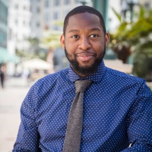Costs Featured Jurisdictions Racial Disparities March 4, 2021
Marshall Project Staff Writer Jamiles Lartey hosted a recent Twitter chat on strategies for addressing racial equity in our criminal justice system as part of the Safety and Justice Challenge’s commemoration of Black History Month.
From ending cash bail to empowering impacted communities in criminal justice reform, to replacing police with community response models for crimes better handled without a law enforcement response, the conversation emphasized ways to hold the system more accountable for racial disparities and to reduce them.
A broad group of participants joined the chat from prosecutors to defenders, and from academics to activists. It took place under the hashtag #RethinkJailsChat, and you can review the whole thing by going to Twitter and searching for the hashtag or simply clicking here.
Some attendees included:
@RashadRobinson — Color of Change President Rashad Robinson
@ResLegalDiva — Melba Pierson, Policy Director at the Steven J. Green School of International and Public Affairs at Florida International University
@DrAprylA — Dr. Apryl Alexander, Associate Professor at the University of Denver Grad School
@JustLeadersUSA — Just Leadership USA — a national nonprofit led directly by impacted people
@PhillyDefenders — the Defender Association of Philadelphia
@CUNYISLG — the Institute for State and Local Governance at City University of New York
@JamiraBurley — activist and social impact strategist Jamira Burley
@APAinc —the Association of Prosecuting Attorneys
@NLADA — National Legal Aid and Defender Association
@AA_Consults — Consultant and trainer for education, empowerment and equity, Alexandra Arrington
@AntiRecidivism — The anti-recidivism coalition
Mr. Lartey set the tone by citing sobering recent research on Black imprisonment in the United States.
Despite declinings incarceration rates over the last decade-plus, the US remains in the midst of a racialized
incarceration crisis, with Black Americans being jailed at five times the rate of their white counterparts.https://t.co/eNkbGrOXMu— Jamiles Lartey (@Jamiles) February 24, 2021
To open, Mr. Lartey linked to a recent report published by the Institute for State and Local Governance showing that overall booking rates are down, but that racial disparities persist. He asked how we can make criminal justice reform more inclusive.
Color of Change President Rashad Robinson, @RashadRobinson, emphasized the importance of holding key decision makers accountable for how they enable a system “designed to incarcerate BIPOC at higher rates.”
The justice system was designed to incarcerate BIPOC at higher rates – from the militarization of our schools to police brutality, the system works as intended. Holding key decision makers accountable for how they enable this system is the clear path forward. #RethinkJailsChat https://t.co/uOEgwkR5JJ
— Rashad Robinson (@rashadrobinson) February 25, 2021
The Defender Association of Philadelphia, @PhillyDefenders, stressed the importance of empowering and encouraging involvement from people in most-impacted communities in criminal justice reform.
#CJReform is only effective when we empower and encourage involvement from the people in communities most impacted, through programs like #ParticipatoryDefense hubs https://t.co/wYZBKetaVy #RethinkJailsChat https://t.co/C9zjTNhAyT
— Defender Association of Philadelphia (@PhillyDefenders) February 25, 2021
The next question focused on a 2018 report from the Prison Policy Initiative that found the “prison penalty” in unemployment disproportionately punishes formerly incarcerated Black men and women, Mr. Lartey asked: “Where are some other places we see this kind of racial disparity play out?”
Responses included disproportionate stops by the police of BIPOC individuals, jail populations, housing and education prospects, all contributing to a “cycle of desperation.”
It begins with contact with police. Black people are disproportionately stopped on the street by police and among those who have contact with police, BIPOC are more likely to experience the use of force. We need to reimagine policing. #RethinkJailsChat https://t.co/gf9hM0SvSP https://t.co/57ituPaUgF
— CUNY Institute for State & Local Governance (@CUNYISLG) February 25, 2021
Contact with the justice system impacts not just employment, but also housing and education prospects. This creates a cycle of desperation that has huge, negative ramifications for Black communities #CJRerform #RethinkJailsChat https://t.co/Ty7iNey1Y4 https://t.co/nevXQhrvfS
— Defender Association of Philadelphia (@PhillyDefenders) February 25, 2021
It plays out in housing, where people w/convictions are unable to live in certain buildings, as well as not being allowed to get student loans. The employment aspect is massive — if you can’t work or go to school, there is no legal path to follow. #RethinkJailsChat https://t.co/ylXRhiJuGW
— Melba Pearson (@ResLegalDiva) February 25, 2021
A3: The lifetime federal ban on public assistance, including food stamps, for people convicted of drug felonies demonizes and reduces benefits for BIPOC who have been disproportionately targeted and incarcerated for drug law violations. #RethinkJailsChat https://t.co/QKqSROLHOV
— JustLeadershipUSA (@JustLeadersUSA) February 25, 2021
Next, the discussion moved to focus on civilian responder models. A 2020 study from Police For Reform and the Center for American Progress found that between 33 and 68 percent of police calls for service could be handled without sending an armed officer to the scene.
“Many feel civilian first responders can help reduce overreliance on police & racial disparities in policing + arrests. The “CAHOOTS” program is a popular example,” Mr. Lartey wrote, linking to an article at The Marshall Project on the program in Eugene, Oregon.
He asked: “Do these kinds of civilian responder programs hold promise for reducing the disparate impact of the criminal justice system? What are some other possible solutions you think are worth mentioning?”
There was broad support for such models, and also, a call for deeper investment in the social safety net.
As stated in @MarshallProj’s The System, “rollbacks in the social safety net, growing income inequality & deinstitutionalization of the mentally ill” have all played into our current policing issues. We have to invest in alternative systems of care & support.#RethinkJailsChat https://t.co/ZFl97qVm29
— Association of Prosecuting Attorneys (@APAinc) February 25, 2021
Yes! Programs like Cahoots in OR have been shown to be effective. Denver is doing something similar. Sweden has been doing this for years. Connecting people with services is better for the community to address underlying concerns; a jail cell solves nothing. #RethinkJailsChat https://t.co/0qQLtzM8a2
— Melba Pearson (@ResLegalDiva) February 25, 2021
A4: Denver’s STAR program has successfully aided in sending mental health providers and social workers to calls instead of police. Over 600 calls they’ve addressed and did not need law enforcement intervention. #RethinkJailsChathttps://t.co/Al7MtCfflG https://t.co/NfIWUypDlP
— Dr. Apryl Alexander (@DrAprylA) February 25, 2021
Next, the conversation concluded by pivoting to bail reform, citing a recent report by Loyola University, which found that bail reform measures in Cook County increased the number of people released pretrial & was not associated with any significant change in the rate of criminal activity.
Mr Lartey asked: What could findings like this mean for the prospect of bolder action on bail moving forward, or the spread of reform efforts? Could more findings like this stem the political backlash that reform efforts often meet?
The question drew an emphatic response:
A5: The evidence is clear that bail reform does not increase crime and poses no threat to public safety. We cannot let fearmongering continue to drive policy around the cash bail system. #RethinkJailsChat https://t.co/VVrjAAmAjM
— JustLeadershipUSA (@JustLeadersUSA) February 25, 2021
Across the country, we’ve seen Black voters elect prosecutors who ran on platforms to #EndCashBail, decline to prosecute low-level offenses and more. And, we’ve also seen historic levels of backlash, particularly when these reforms are brought by Black women. #RethinkJailsChat https://t.co/StVtE0UdgJ
— Rashad Robinson (@rashadrobinson) February 25, 2021
We have to fight the false narrative of bail reform = unsafe communities. It helps communities by reducing people losing jobs, families instability, & long term consequences of being justice involved. If we believe innocent until proven guilty- let’s act like it #RethinkJailsChat https://t.co/WqgmvX82wA
— Melba Pearson (@ResLegalDiva) February 25, 2021
—Matt Davis is a communications consultant supporting the Safety and Justice Challenge blog.

